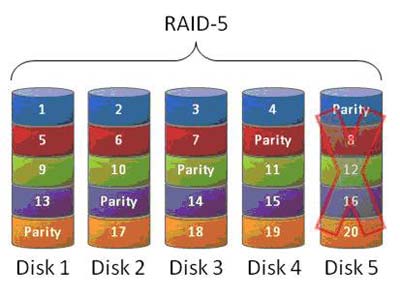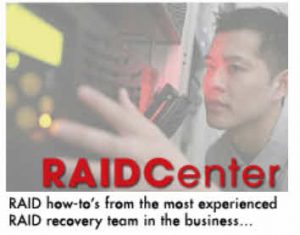
Ask a question, request a quote or check recovery status. Call us.
We are ready to help you recover your data 24 hours/day, 7 days/week!
Talking About RAID Drive Failure
It’s every tech’s nightmare. What do you do when your supposed fail-safe, i.e. your RAID 5 or 10 system, reports a RAID drive failure? Even worse, what if your RAID server array reports multiple RAID drive failures? What do you do about recovering data from hard drive array setups that have broken down? The answer is more complex than you might think.
 And while there are several RAID repair software applications on the market, it is important to first note that they are usually ineffective, especially in cases where hardware has failed. After all, if your RAID drive is broken or you have multiple hard drive crashes, how is it possible to recover it using some for of software?
And while there are several RAID repair software applications on the market, it is important to first note that they are usually ineffective, especially in cases where hardware has failed. After all, if your RAID drive is broken or you have multiple hard drive crashes, how is it possible to recover it using some for of software?
Click here to request a free RAID evaluation.
Can RAID Systems Fail?
Yes. RAID systems are incredibly robust, and can run mission critical business applications without error for years without any issue. They are the main choice of most businesses who need to ensure that a single hard drive failure won’t damage their business at any level. But despite their robustness, the RAID system does have a single weak link: the mechanical nature of hard disk drives, as well as the issues they may face, including hard drive clicking noise.
24 hour RAID Recovery is available here. Click here to contact us.
Hard Drive Failure – A Fact of Life?
Over the past 20 years, the Hard Drive as a technology has advanced by leaps and bounds. It’s startling when you consider that as a company, we used to run our business recovering drives smaller than 10MB!
Times have changed remarkably, of course, with Terabyte hard disk drives now common, and the ability for people to buy Petabyte drives(or 1000 Terabyte) not as broad a fantasy as it used to be.
The key issue with drives today that make them more likely to fail than ever is their size, which contributes to the heat they generate, and thus their ability to fail.
Outside of newer Solid State Hard Drives, regular hard drives are simply mechanical beasts, somewhat similar to your car, with lots of moving parts.
And what we’ve seen is that things with moving parts are not just liable to fail, but are in fact doomed to fail. Age, heat and use take their toll on any system, and a RAID hard drive, with its higher level of use (corporate environments frequently show no mercy to a RAID hard disk), is not immune to failure at all. In fact, it is simply a matter of time.
Multiple Drive Failures – Where HDRG Comes In
With many failed RAIDs, the issue is rarely because of a single hard drive failure. In fact, in the event of a single RAID hard drive failure, the RAID controller itself can frequently repair the overall RAID array with minor intervention.
In cases like this, your RAID support vendor can usually provide you with a solution that can be executed quickly and easily.
Where professional RAID repair shops like Hard Drive Recovery Group come in is with multiple drive failures. In most cases, if multiple drives have failed, or the RAID controller itself has failed, there is little you can do but call a professional. Once you have encountered an issue like this, it is almost always necessary for you to call a professional as soon as possible in order to avoid major data loss.
A simple fact most IT people do not know is this: the largest cause of data loss after multiple drive failure is one thing and one thing only: human error.
Click here to request a free RAID evaluation.
RAID Hard Drive Failure Tips
No matter which way you slice it, RAID drive recovery is one of the most complex forms of data recovery service available today. Because a RAID system consists of more than just a single hard disk drive, professional care must be taken not only to extract the data from the RAID drive for recovery, but also to rebuild the RAID array safely, and without data loss on the other drives within the array.
The beauty of the RAID storage system is both its speed, and its robustness. No other comparably priced solution has the ability to recover from single hard disk failure with all of its data intact, all while the system continues to function.
While RAID 0 is an exception, in that it features complete storage shutdown in case of RAID failure, almost all RAID systems offer complete RAID restoration capabilities for even the most amateur of users.
RAID failures aren’t always because of common circumstances, however. At Hard Drive Recovery Group, many of our RAID repair jobs come because of natural disasters such as floods or fire. In cases like this, it is usually quite likely that if one raid hard drive has failed, others are likely to have failed as well.
Single RAID Drive Failure vs. RAID Failure
RAID systems are not commonly known as failure-prone storage solutions. In fact, outside of the previously mentioned RAID 0, the “Redundant” in RAID speaks to the automatic backup capabilities of the system, when combined with parity information.
The reality is, even with RAID 1, the likelihood of complete RAID hard drive failure within 3 years of installation, according to recent tests, is only 0.25%. This percentage may even be lower, in fact, because of the fact that the course of action upon a first RAID hard disk failure is typically to replace that disk.
Typically, while a single hard drive failure merely causes degraded performance, which in percentage terms is much worse depending on the configuration (RAID 10, as an example, would have far less degradation than RAID 1, as it simply has more hard disks to work with).
RAID Catastrophe
Where RAID hard drive failure can cause catastrophic data loss is when more than one drive fails at once. This is typically quite rare, but does happen, as often larger RAID configurations such as RAID 6 or greater are often run with one failed hard disk for months before the original drive loss is noticed.
RAID controller failure can also cause complete system failure, but this is quite uncommon as well. But no matter the probability of either failure, if your RAID system has encountered a failure, it is key to remember to not panic, and definitely DO NOT do anything which could compromise the data on the drives.
Good RAID Repair Tools?
A RAID array, whether RAID 0, 10 or 50, is by nature a very complex storage solution. The subtleties of the format are such that it is always better to deal with a professional data recovery technician, as opposed to a boxed software solution.
While even our data recovery technicians do use RAID failure diagnosis software, we never use automatic RAID repair software. In most cases, these applications are actually worse for your RAID array than doing nothing.Contact us here for a free RAID system repair consultation.
Don’t Panic!
While it sounds very obvious, you’d be surprised how many RAID drive failure repairs become impossible because of this simple human emotion. No matter how skilled an IT administrator is, 99 times out of 100, they are unlikely to be able to fix a failed RAID array.
The result can frequently be panic, and even more data loss than originally expected. Whenever a RAID array needs repairing, its best to consult a professional. Sit back, analyze the situation, but whatever you do, DO NOT attempt to initiate RAID recovery on your own.
Seek Professional RAID Advice
Any RAID repair specialist worth his salt is likely willing to provide you with some free advice. Sometimes, merely making a call can ensure your simple RAID drive failure doesn’t turn into a catastrophic raid array loss. As experts with all RAID array manufacturers, we at HDRG have seen time and time again that the worst issue in most RAID array failures is human intervention.
Panic and software repair tools are the two major enemies of effective RAID restoration, and are unfortunately the first two things that IT administrators look to when a server appears to be lost. Don’t be a victim of this.
“>Contact us here for a free RAID system repair consultation.



